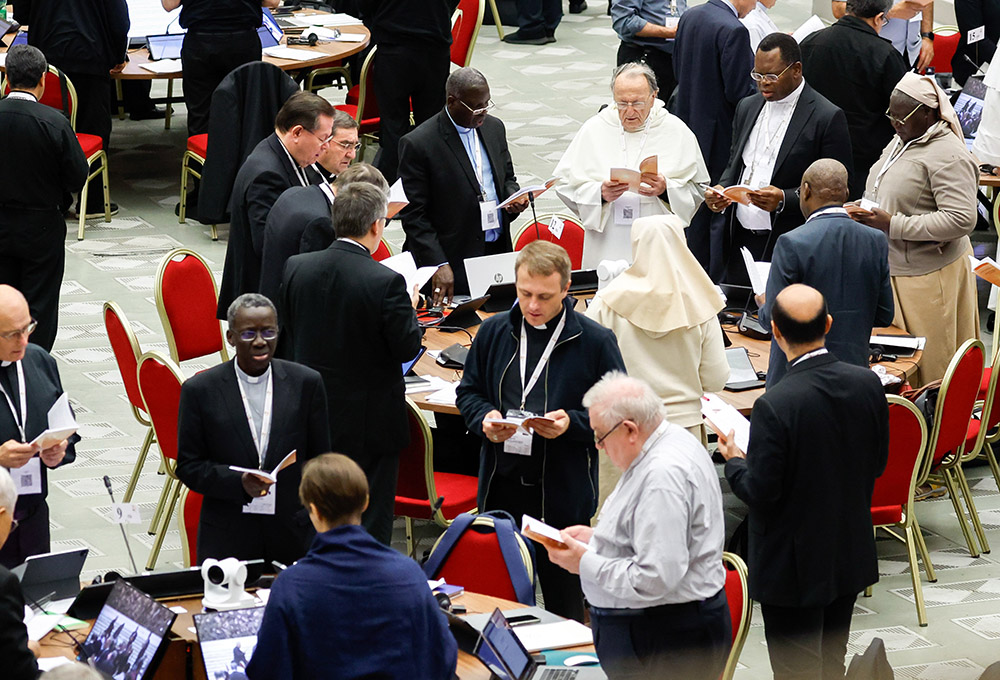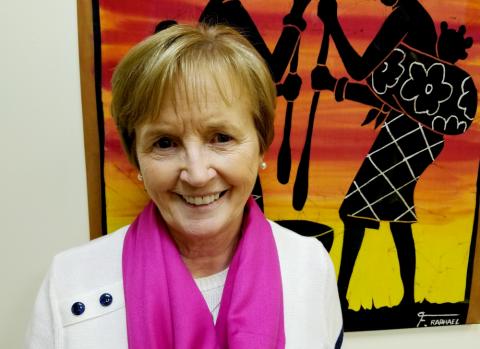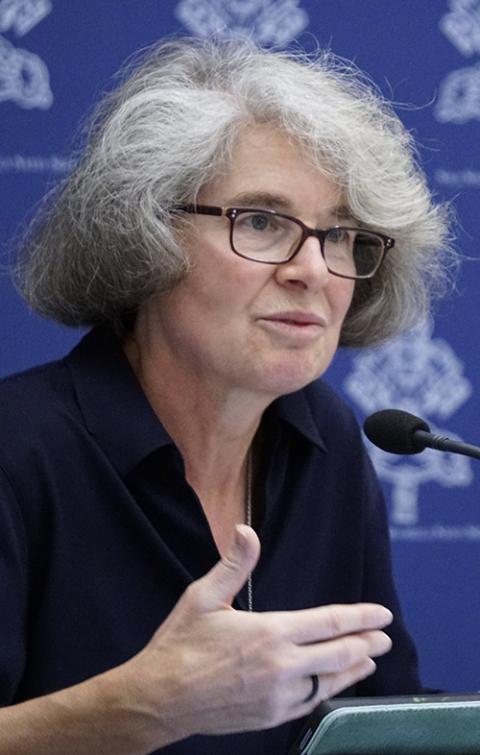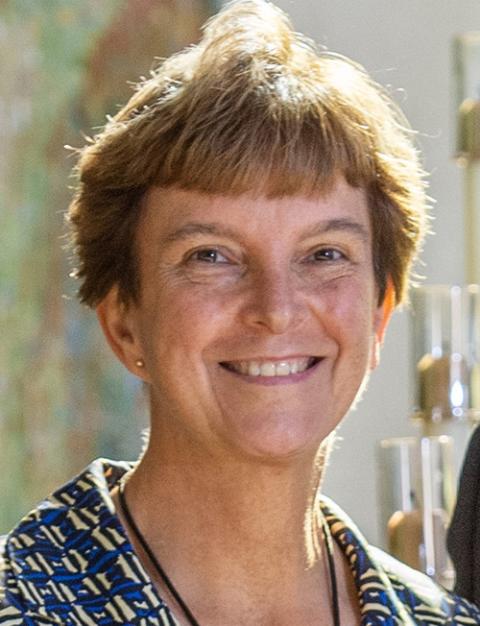
Members of the assembly of the Synod of Bishops pray before a working session in the Vatican's Paul VI Audience Hall Oct. 26. (CNS/Lola Gomez)
The first Vatican session for the synod on synodality, Pope Francis' multiyear summit on the future of the Catholic Church, was both fruitful and profound, women religious say, but it also had missed opportunities.
The first session of the Synod of Bishops at the Vatican concluded Oct. 28 with a 41-page "synthesis" report on the discussions. The second session will be held in Rome in October 2024 and will create a final report of proposals for Pope Francis to consider.
This first report, titled "A synodal church in mission," follows an intense month of debates among some 450 participants over a range of big issues, including the role of women in church ministries, clergy sexual abuse and better inclusion of LGBTQ Catholics.
For the first time since the establishment of the church's Synod of Bishops in 1965, about 50 women were granted voting rights by the pope at the assembly.
"I won't use the term success, but it has been fruitful. It's a new state in the experience of synodality — there was a lot of grace, it was a time of joy," said Xavière Missionary Sr. Nathalie Becquart, an undersecretary of the Vatican's Synod of Bishops office, which made her not only a voting participant but a member of the synod itself. "It brought us more communion. There was mutual listening and understanding from different people with different backgrounds and perspectives. So in a sense it was a true synodal experience."
Those who were disappointed by the results — many were hoping for steps forward on issues such as ordaining women as deacons or inclusion of LGBTQ Catholics — misunderstood what the gathering was about or how the process works, Becquart said.
"What we have to explain to people is this was not the synod that makes decisions," she said. "This was the first session and the synod is not finished. The second session is next October, where the final document will have proposals to the pope."
The synthesis report, Becquart said, creates a road map for discussions to take place around the world over the next 11 months.
But even that report "also has many concrete proposals, and some can already be implemented," she said. "You don't have to wait for change to come from Rome."
The report makes 81 proposals, which are often quite open-ended. It calls for further theological or canonical study, evaluation or consideration at least 20 times.
While the report did not call for the ordination of women as deacons, or even mention priestly ordination for women, it did offer some pointed language about the role of women in church leadership.
In one example, the text says women in the assembly "spoke of a Church that wounds. Clericalism, a chauvinist mentality and inappropriate expressions of authority continue to scar the face of the Church and damage its communion."
Advertisement
The text also states that there was a "clear request" from the assembly that women's contributions "would be recognized and valued, and that their pastoral leadership increase in all areas."
It also asks how the church can include more women in existing ministries, and poses an open-ended question: "If new ministries are required, who should discern these, at what levels and in what ways?"
Sr. Jean Quinn of Ireland, a member of the Congregation of the Daughters of Wisdom who is executive director of UNANIMA International, an nongovernmental organization at the United Nations, said that although it was a positive sign that 21% of the synod participants were not bishops, it is difficult to see the report request a study into how to include women in decision-making when women religious have been providing a model for centuries.
"We're already doing that, significantly," Quinn said. "They could come to us and look at what that style of leadership would mean."
As for women in the diaconate, she said she is "not sure I am behind the whole thing," but was distressed by the number of votes against the idea. The two paragraphs addressing the issue passed, but had almost 20% of participants voting against them.

Daughter of Wisdom Sr. Jean Quinn, executive director of UNANIMA (GSR photo/Chris Herlinger)
"That for me was very challenging," Quinn said. "What we as women religious will be calling for is listening and conversations, but also learning. If there were so many noes to women in the diaconate, what are we learning from this? We can't just keep talking."
She was also disappointed that LGBTQ Catholics were not mentioned in the report.
"They were in the documents right up to the end, and not in the final document. Language is very important. Words are important," Quinn said. "People that wanted to be included in the church were not in that document."
Religious of the Sacred Heart Sr. Maria Cimperman, who is a coordinator of synodal activities for the International Union of Superiors General and one of about 40 women religious who participated in the synod, said people need to remember the synod is about the journey, not the destination. The focus is not on what issues can be changed, but on how the church walks together with those in and out of the pews, she said.
"Was it a success? Absolutely. Do I believe we did everything we could have in this month? Yes. Pope Francis' point is the product is the process," she said.
Cimperman said the process was life-changing.
"The method created a community that could have conversations and sharing in a manner that was not polarizing, that was not us vs. them, you vs. me," she said. "It actually created a spirit of discernment."
The process also provided time for deep listening followed by prayer and reflection.
"It was like sharing the results of your retreat day, but it required you to have listened enough to offer what you heard that moved you in your heart," she said. "We're used to speaking; we're not used to listening at that level. But when you listen that deeply, something shifts."
Part of what made that work, she said, was that all participants — bishops and non-bishops alike — were treated equally.
"We were all at the same level; we were having a conversation in the Spirit," Cimperman said. "And each person at the table was equally responsible."
While the synod may not make any changes in the church that are immediately visible, even after it concludes in 2024, she said, it can change the church in ways that could lead to the reforms many are calling for. A church that truly engages in deep listening cannot help but be changed.
"Ultimately, we're trying to listen to the Spirit and not my agenda. It's not about me, but about what the Spirit is asking of us. The process is the key," Cimperman said. "And when we do that, we can be surprised in where things lead us. Sometimes a new way forward or a new way of engagement comes forth, because we really listened. ... I think we're setting up a way of being and communicating and sharing that sets us up to have those conversations that will be far more nuanced next year."
She said participants got a glimpse of what can happen when the church is truly synodal.
"It's more inclusive, more engaging, more understanding of people's baptismal dignity," Cimperman said. "It was profound. Profound. You were watching transformation happen, and it was sacred."









